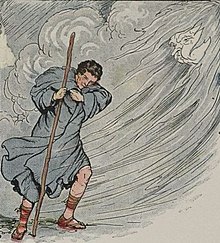
Back Vermensliking Afrikaans Anthropomorphismus ALS تجسيم Arabic Antropomorfizm Azerbaijani Антрапамарфізм Byelorussian Антрапамарфізм BE-X-OLD Антропоморфизъм Bulgarian নৃতাত্ত্বিকতা Bengali/Bangla Denheñvelegezh Breton Antropomorfisme Catalan


Anthropomorphism is the attribution of human traits, emotions, or intentions to non-human entities.[1] It is considered to be an innate tendency of human psychology.[2] Personification is the related attribution of human form and characteristics to abstract concepts such as nations, emotions, and natural forces, such as seasons and weather. Both have ancient roots as storytelling and artistic devices, and most cultures have traditional fables with anthropomorphized animals as characters. People have also routinely attributed human emotions and behavioral traits to wild as well as domesticated animals.[3]
- ^ Cite error: The named reference
oedwas invoked but never defined (see the help page). - ^ Hutson, Matthew (2012). The 7 Laws of Magical Thinking: How Irrational Beliefs Keep Us Happy, Healthy, and Sane. New York: Hudson Street Press. pp. 165–81. ISBN 978-1-101-55832-4.
- ^ Moss, Stephen (15 January 2016). "What you see in this picture says more about you than the kangaroo". The Guardian. Archived from the original on 18 September 2019. Retrieved 17 January 2016.